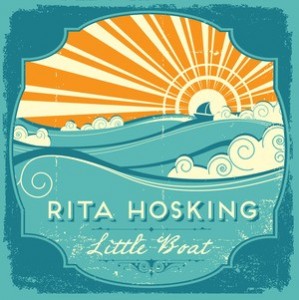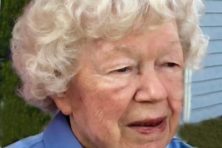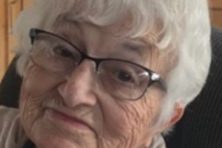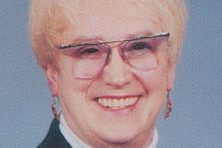Q&A with Musician Rita Hosking
- Share
- Tweet
- Pin
- Share
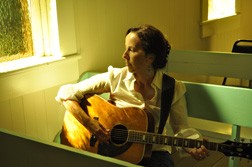
“I write songs from all sorts of directions – lyrics first, melody first, in my head, on guitar, but mainly I play and sing nonsense until something sounds good to me,” says Rita Hosking. Photo by Sean Feder.
Sweet, melancholy, with a little mountain folk – that’s the sound of Rita Hosking’s gorgeous tunes. The singer-songwriter will perform at The White Gull Inn on March 12 with her banjo-playing husband Sean Feder.
I caught up with Hosking before her first ever trip to Door County to talk songwriting, Cornish relatives, and her celebrated album Little Boat.
Sally Slattery (SS): I understand you are the descendant of Cornish miners who sang in the mines. Was it your family that introduced you to music?
Rita Hosking (RH): I’d say my family definitely influenced me most. My mother is very musical—she was active in music (flute, choir, piano) at our church and would even sometimes play me to sleep on an old upright piano that was stored in my bedroom.
At Christmas time, my father would tell us kids to “sit down and shut up,” and he would put on an old 78 record of his grandfather’s group singing. They were Cornish miners who played many events in Northern California and Nevada, and were even broadcast live on national radio once – from underground. He and his father would stand and hum and sing along to the record, while gazing out the window at the snow. It was a holy, annual ritual of sorts that had me mesmerized.
My grandpa was born to his immigrant parents in Ishpeming (they later moved to California to work at Empire Mines,) and I understand there were many Cornish who came to Wisconsin, as well!
SS: When did you realize you had some talent and wanted to write songs? Do you remember the first song you ever wrote?
RH: I used to sing to myself pretty regularly. My mom recalls me making up songs a lot, and she surprised me a few years ago with a scrap of paper she had saved. It was a song I had written down, probably around the age of 10. It was about a jailbreak.
I used to sing to myself while waiting for the school bus. Since we lived in a remote area, no humans were around to hear and I could really sing hard. I remember one time thinking, “hey, that sounds pretty good.” Then our school cook, Pauline, decided to gather some of us and form an old time-ish band made up of us teenagers. She was in our only local band, The Mountaineers – a jug band made up of many old mountain characters. I think she thought it was time to pass the torch, and my sister and I were recruited. We played local events, Fourth of July Parade, and so on – I think I enjoyed it more than I thought I would!
SS: What is your songwriting process now?
RH: I write songs from all sorts of directions – lyrics first, melody first, in my head, on guitar, but mainly I play and sing nonsense until something sounds good to me. After working on it a while longer, I’ll figure out what it is and what it is about!
I’ve just started a new project for my next record that is a little different, however. This time I’ve got an organizing principle and theme from the get-go, inspired by some drawings that I made. So, I’m approaching the songs more from the outside, as if I’ve targeted some holes and I’m going to go look down them and see what I find.
SS: Your songs feature such beautiful imagery, but untraditional topics – “forest fires, culture clash, demolition derbies, the working class and hope,” according to your website. What are you trying to communicate through your music?
RH: Each song I write can be very different from the next, so I need to take several steps back to determine what I’m trying to communicate through my music. I’ve listened to reviewers as well, to figure this out. I think it’s possible to make some generalizations that my songs are speaking from the working class, usually from rural areas. Much of my upbringing is centered around hard work and struggling to hold on to what you love dearly, which was loved ones, our little piece of land, and freedom. I believe that’s a theme that most people can relate to. All the emotions that come along with that are varied and represent much of the human experience.
SS: Congratulations! Little Boat was named one of the “Top 10 Country Albums of 2013″ by the UK Telegraph. What sets this album apart from others you have released?
RH: Thank you! Little Boat was meant to be an intimate, family affair. The players are myself, my husband Sean Feder, our daughter Kora Feder and my producer and friend of several years, Rich Brotherton. I think the only other person we brought in was Rich’s wife Kathy, when we needed an accordion.
It’s acoustic (like most of my music) and folky. I think it’s similar to my other records, albeit toned down a little bit in terms of production. My other recent records have also fared well with the critics – I’m very lucky in that regard!
SS: You often perform with your husband, Sean Feder, what does he contribute to your songwriting and sound?
RH: Sean and I have been together since my 21st birthday (that’s over half my life.) I can’t truly measure his influence as he’s so much of who I am today. He and have written a couple songs together, but mainly our musical collaboration lies in his accompaniment on dobro (resophonic guitar), banjo, and harmonies.
Sean’s musical background is rich and eclectic – he’s one of those people who can play almost any instrument you hand him. When we met, he was the local hand drumming, Afro-Cuban, percussion guru who was in world beat or Latin bands and teaching enormous group classes. He also loves jazz, classical, the Grateful Dead, bluegrass, the list goes on. He approaches performance with real love and deep respect for music.
SS: What are you working on these days?
RH: I’m working on my next record, writing custom songs for folks, coaching songwriters, and a lot of lot of music business stuff. When not touring, I spend most of my time on the computer promoting shows and recordings one way or another, arranging travel, etc.
Being an independent musician requires quite a variety of job skills that I came to more slowly than the music part, but am thankful for them all the same. On top of and before all that, I’m also an active mom – we have two teen daughters who are both very musical.
SS: Ever been to Door County before?
RH: We’ve never been to Door County before, and we’re looking forward to it very much!
Tickets for the 8 pm concert are $16. The White Gull Inn is located at 4225 Main Street in Fish Creek. For more information call 888.364.9542 or visit whitegullinn.com.
To learn more about Hosking and listen to her music, visit ritahosking.com.

